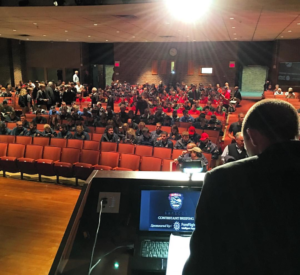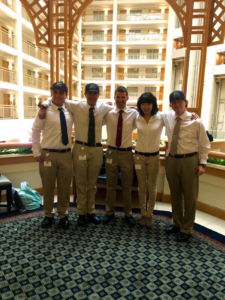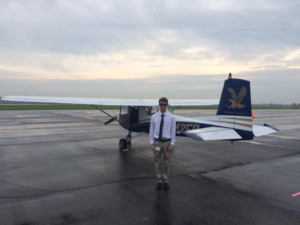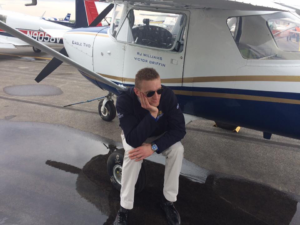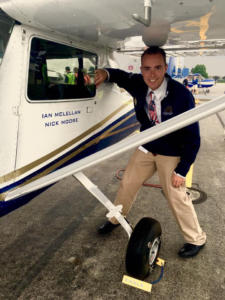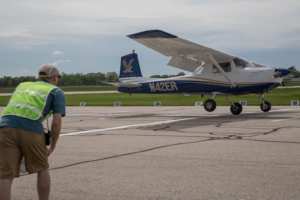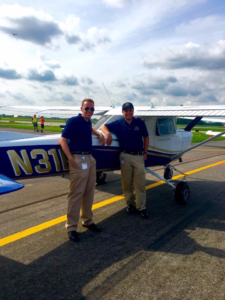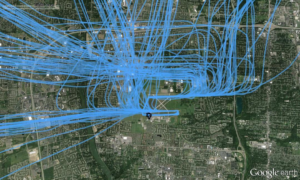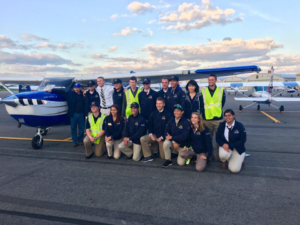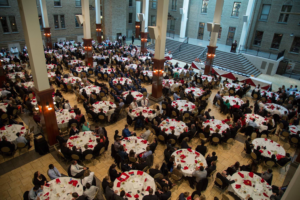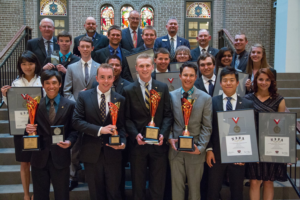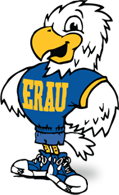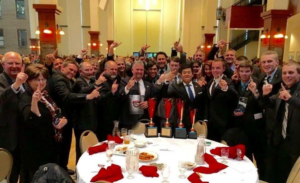 Recently, the NIFA (National Intercollegiate Flying Association) National SAFECON Competition took place May 6th-14th. Twenty-five collegiate flight teams from all over the nation gathered at Ohio State University in Columbus to compete against one another in several ground and flying events. The events included Precision Power-on and Power-off landings, Navigation, Computer Accuracy (E6B), Simulated Comprehensive Aircraft Navigation (SCAN), and Ground Trainer (Sim). As a member of the Golden Eagles Flight Team, I had the honor of representing Embry-Riddle Prescott and competing at this year’s nationals; and helping us bring home our tenth win since 1993!
Recently, the NIFA (National Intercollegiate Flying Association) National SAFECON Competition took place May 6th-14th. Twenty-five collegiate flight teams from all over the nation gathered at Ohio State University in Columbus to compete against one another in several ground and flying events. The events included Precision Power-on and Power-off landings, Navigation, Computer Accuracy (E6B), Simulated Comprehensive Aircraft Navigation (SCAN), and Ground Trainer (Sim). As a member of the Golden Eagles Flight Team, I had the honor of representing Embry-Riddle Prescott and competing at this year’s nationals; and helping us bring home our tenth win since 1993!
The week started out with the general contestant briefing on Monday at OSU’s Fawcett Center. Here, all competitors and coaches were briefed on safety procedures, rules, event locations, and everything else that related to the competition. “Roll Call” also happens at the briefing, where each school is called upon and some schools (including us) perform short skits or even dances just for the fun of it!
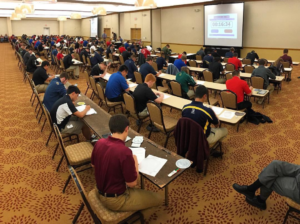 As soon as the briefing was over, the competition officially began with the three core ground events: Computer Accuracy (CA), Simulated Comprehensive Aircraft Navigation (SCAN), and Aircraft Identification (ACID). Each event consists of a 60-minute test relating to various aviation-based knowledge areas. Each team typically has five competitors for each event, and one alternate. First up was CA, which is a math-based event done with an E6B or CR flight computer. Next was ACID, in which contestants are given three seconds to identify an aircraft’s manufacturer, identification number, and common name. Last but not least was SCAN, which requires contestants to plan a flight of three or more legs and answer various regulations, weight and balance, and performance questions pertaining to that flight. I was the alternate competitor for SCAN.
As soon as the briefing was over, the competition officially began with the three core ground events: Computer Accuracy (CA), Simulated Comprehensive Aircraft Navigation (SCAN), and Aircraft Identification (ACID). Each event consists of a 60-minute test relating to various aviation-based knowledge areas. Each team typically has five competitors for each event, and one alternate. First up was CA, which is a math-based event done with an E6B or CR flight computer. Next was ACID, in which contestants are given three seconds to identify an aircraft’s manufacturer, identification number, and common name. Last but not least was SCAN, which requires contestants to plan a flight of three or more legs and answer various regulations, weight and balance, and performance questions pertaining to that flight. I was the alternate competitor for SCAN.
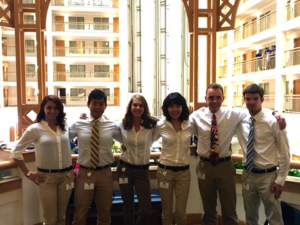
Our SCAN contestants (Left to right): Maddy Mearsch, Chin-An “Johnason” Lin, Rachel Hutzell, Bella Batbileg, Ian McLellan, and RJ Williams
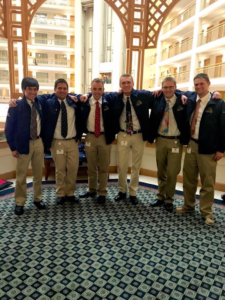
Our ACID crew: Matt Hallock, Stephen Anderson, Ian McLellan, Victor Griffin, Nick Moore, and Connor McNicholas
Day two consisted of power-off landings, or OFFS as we like to call them. Despite some bad weather that temporarily put us on hold, we were able to complete all five rounds of OFFS. The main objective with OFFS is to touch the main gear down as close as possible to a white chalk line that’s drawn across the runway, called the “zero line”. The closer you are to the zero line, the better your score will be. There are several penalties that a competitor can get such as adding power or improper crosswind inputs. We had five total competitors represent us for OFFS, in which four placed in the top 20 out of over 100 other competitors!
On the third day, some low ceilings put the competition on hold for most of the morning. However, the ceilings eventually lifted and allowed us to carry on with power-on landings! ONS are very similar to OFFS, with the only difference being that the competitor is now allowed to adjust power on each approach (this isn’t allowed in OFFS). The judges sure had their work cut out for them, but luckily we were able to finish almost all five rounds of ONS. In addition to ONS, I had the pleasure of competing in the ground trainer event with my fellow teammate Nick Moore. We each flew an eight minute instrument pattern on a FRASCA simulator, and we both ended up placing in the top five!
On the fourth day of nationals, we competed in message drop. Possibly NIFA’s most fun event, message drop involves teams of two: a pilot and a drop master. The pilot flies the plane 200 feet above the runway, while the drop master drops a container out of the window so that it lands as close as possible to a barrel on the ground.
On the fifth and final day of competition, we competed in Navigation (Nav). Nav was originally supposed to happen earlier in the week, but some bad weather forced the judges to delay it until Friday. For Nav, teams of two (a pilot and a planner) fly an assigned route, using exact coordinates to fly to and pictures on the ground that the teams must find. Grading is strict, with time and fuel graded down to the second and tenth of a gallon!
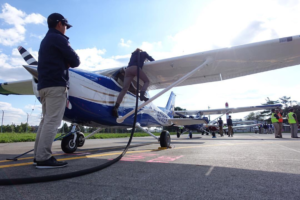
Pilot Johnason Lin watches planner Rachel Hutzell refuel after flying their route. Photo credit: NIFA
We had a long, eventful week of competition, and we were all very happy with our performance. After all events were complete, all that remained was the awards banquet!
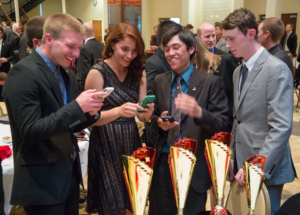 Saturday was the big day. We couldn’t wait to find out how we did, and if all the hard work we put in this past year payed off. The awards banquet was held at St. Charles Preparatory School in Columbus, in a huge ballroom. After dinner, it was time to announce the results. After much suspense, it was finally time to find out which school would go home national champions. The head judge announced this year’s champions: The Golden Eagles Flight Team!! We all stood in disbelief for a few seconds, waiting for the announcement to sink in. All those late night practices, and all those early morning, all-day Saturday practices had paid off. Almost all our team competitors placed in the top twenty or the top ten in each event, and we were also privileged to win the judges trophy! In addition, we took home first place in overall ground events and third place in overall flight events. As we all hugged each other and as congratulations were said, we felt absolutely overjoyed to take home GEFT’s tenth national championship. Not only did we return national champions, we returned as the most “winningest” collegiate flight team in history. Here’s to this year’s NIFA National SAFECON, and here’s to bringing home number eleven next year!
Saturday was the big day. We couldn’t wait to find out how we did, and if all the hard work we put in this past year payed off. The awards banquet was held at St. Charles Preparatory School in Columbus, in a huge ballroom. After dinner, it was time to announce the results. After much suspense, it was finally time to find out which school would go home national champions. The head judge announced this year’s champions: The Golden Eagles Flight Team!! We all stood in disbelief for a few seconds, waiting for the announcement to sink in. All those late night practices, and all those early morning, all-day Saturday practices had paid off. Almost all our team competitors placed in the top twenty or the top ten in each event, and we were also privileged to win the judges trophy! In addition, we took home first place in overall ground events and third place in overall flight events. As we all hugged each other and as congratulations were said, we felt absolutely overjoyed to take home GEFT’s tenth national championship. Not only did we return national champions, we returned as the most “winningest” collegiate flight team in history. Here’s to this year’s NIFA National SAFECON, and here’s to bringing home number eleven next year!
For more about NIFA, check out: www.nifa.aero
For a full list of results, check out: https://nifa.aero/wp-content/uploads/SAFECON-2016-Results.html
And be sure to “like” our Facebook page!



